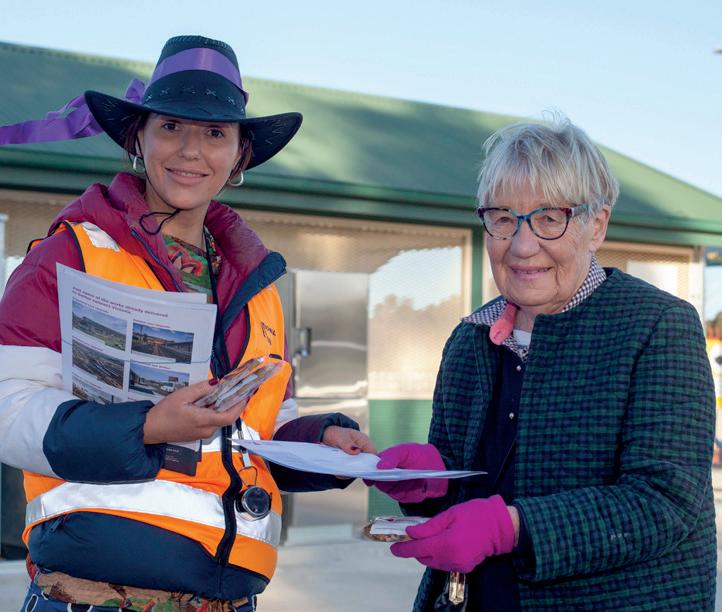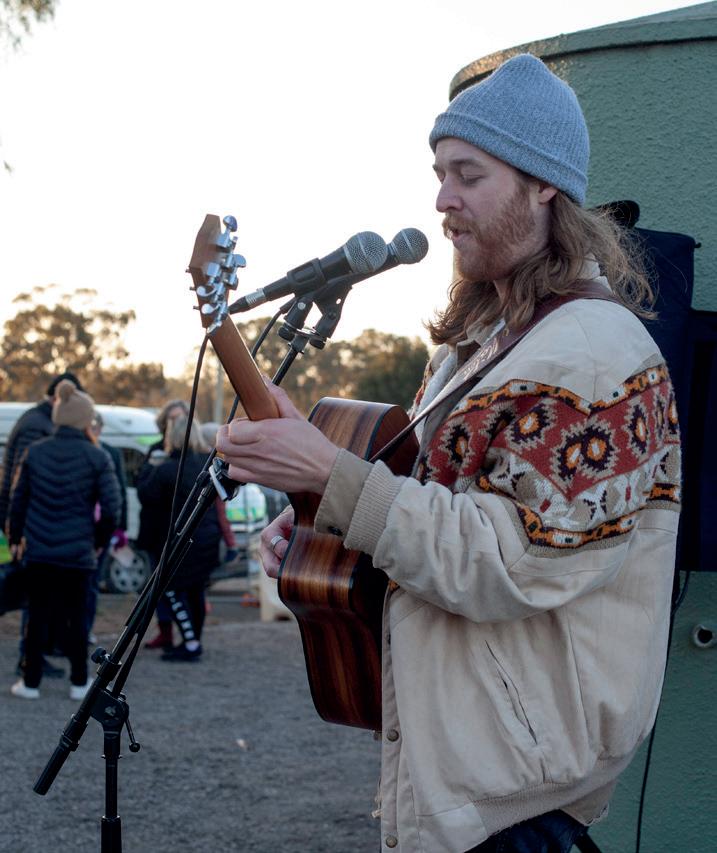
5 minute read
Celebrating Improvements to Murchison East Railway Service.
Despite the chilly wind that was blowing, local residents happily joined in the activities provided by Regional Rail Revival at the Murchison East Railway Station on Friday evening, September 2, celebrating the multimillion-dollar upgrade that will result in improved and more frequent rail services.

Advertisement

Murchison Primary School’s orchestra played, refreshments were provided, information and give aways from Regional Rail Revival were available and railway history displays set up by the Murchison Historical Society, were popular. Official guests included Suzanna Sheed, MP who has long voiced the need for more trains on the Shepparton line, and Jon Daivis, the last Station Master to work at Murchison East Railway Station.
The upgrade features a platform extension to accommodate the longer, more modern and reliable VLocity trains, as well as accessibility improvements including asphalted car parks and increased spaces, CCTV coverage of the platform and better lighting, seating and shelter. The Murchison East crossing loop is being extended, allowing more opportunities for trains to pass each other.
The friendly, convivial atmosphere on the night, despite the air temperature, was in stark contrast to the frosty greeting the completion of the railway extension from Avenel to Murchison East received back in 1879, as the then Minister for Railways would not permit the use of the line until it had been carried through to Shepparton. Also, the location of the station was some distance from the town with access via a road that was often impassable in wet weather.
The first train to reach Murchison East was in

January 1880 once the track was completed through to Shepparton. Shortly afterwards, sparks from the engine ignited devastating fires alongside the line, causing stock and crop losses worth thousands of pounds, for which farmers received hefty compensation pay-outs!
It would be another ten years before the bridge was built over the Goulburn River for a branch line to Rushworth and the provision of a station in the township of Murchison. Community leaders agitated for further lines from Rushworth to Colbinabbin, completed in 1914, and the Rushworth to Stanhope extension which opened in 1917. Large volumes of grain and farm produce have been carried by rail over the years, as well as providing passenger services for local residents. The railway was critical during World War 2, supplying provisions, transporting army personnel and equipment, along with prisoners of war and internees destined for the camps located around Waranga Basin.
The branch lines to Rushworth and beyond closed in 1987 and are slowly being developed into rail-trails for pedestrian and non-motorised vehicles. The Murchison to Channel Inlet Road Rail Trail was opened in February 2015. It is great to see these improvements in the rail infrastructure actually happening and that mean better rail services for our local community as well as surrounding towns such as Tatura and Rushworth, whose residents access the train at Murchison East Railway Station.
- Kay Ball, Murchison & District Historical Society.
Common Superstitions
1. It is bad luck to open an umbrella indoors. In eighteenth-century England, the usage of metal-spoked waterproof umbrellas became very common among the middle-class, and their stiff, clumsy spring mechanism made them quite hazardous if opened indoors. A rigidly spoked umbrella, opened suddenly in a small room could seriously injure somebody or shatter nearby fragile objects. This superstition therefore arose as a deterrent to opening an umbrella indoors.
2. It's bad luck to walk under a leaning ladder.
This superstition originated 5,000 years ago in ancient Egypt. A ladder leaning against a wall forms a triangle, and Egyptians regarded this shape as sacred, which is why it was used in their pyramids. To Egyptians, triangles represented the trinity of the gods, and to pass through a triangle was to desecrate them. This belief continued in some form through the ages until eventually Christians took ownership of it, explaining that because a ladder had rested against the cross when Christ was crucified, it became a symbol of wickedness, betrayal, and death. Walking under a ladder therefore, invited misfortune. In England in the 1600s, criminals were forced to walk under a ladder on their way to the gallows.
3. A broken mirror gives you seven years of bad luck.
In ancient Greece, it was common for sick people to consult ‘mirror seers’ who told their fate by analysing their reflection. This was performed by dipping a mirror into some water and the sick person was then asked to look into the glass. If the image appeared distorted, the person was likely to die; if clear, they would live. The Romans then changed the superstition slightly, as they believed that peoples’ health changed in seven-year cycles. As a broken mirror would distort the person’s image, it would mean seven years of ill-health and misfortune, rather than outright death.
4. When you spill salt, toss some over your left shoulder to avoid bad luck.
Spilling salt has been considered unlucky for thousands of years. Around 3,500 B.C., the ancient Sumerians first took to nullifying the bad luck of spilled salt by throwing a pinch of it over their left shoulder. This ritual spread to the Egyptians, the Assyrians and later, the Greeks. The superstition ultimately reflects how much people prized salt as a seasoning for food. The origin of the word ‘salary’ shows how highly it was valued. The Romans used the phrase ‘not worth his salt’ as a criticism of under-performing Roman soldiers, who were given special allowances for salt rations, called salarium, or 'salt money', which is the origin of the word 'salary.'
5. Knock on wood to prevent disappointment. Nobody is sure how this one came about. Some historians attribute it to the ancient religious custom of touching a crucifix when taking an oath, while others believe it may have had its origin with superstitious peasants who believed in knocking loudly to keep out evil spirits.
6. Always 'God bless' a sneeze. In many countries, it is polite to respond to another person's sneeze by saying "God bless you." Some early cultures believed that sneezes expelled evil spirits, but this particular custom began in the sixth century by order of Pope Gregory the Great. A plague was spreading through Italy at the time and the first symptom was severe, chronic sneezing which was often followed by death. Pope Gregory urged people to pray for the sick and ordered that the usual responses to sneezes such as "May you enjoy good health" be replaced by the more urgent "God bless you!"
7. Hang a horseshoe on your door open-endup for good luck.
The horseshoe is considered a good luck charm in a wide range of cultures. Belief in its magical power traces back to the Greeks, who thought iron had the ability to ward off evil. Not only were horseshoes made of iron, they also took the shape of the crescent moon which was a symbol of fertility and good fortune.
8. A black cat crossing your path is unlucky. During the Middle Ages, people in many parts of Europe thought black cats were the ‘familiars’, or companions, of witches, or even witches themselves in disguise, and that a black cat crossing your path was an indication of bad luck and a sign that the devil was watching you.
9. Fear of the number 13, (known as triskaidekaphobia).
This superstition has its origins in Norse mythology. In a well-known tale, twelve gods were invited to dine at Valhalla, the city of the gods. Loki, the god of strife and evil, crashed the party, raising the number of attendees to thirteen. The other gods tried to kick Loki out, and in the struggle that ensued, Balder, a favourite among them, was killed. Scandinavian avoidance of 13-member dinner parties, and dislike of the number 13 itself, spread south to the rest of Europe. It was reinforced in the Christian era by the story of the Last Supper, at which Judas, the disciple who betrayed Jesus, was the thirteenth guest at the table.
- John Kriesfeld










